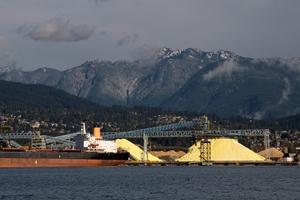
Patrick Britton
Published: May 01, 2015
Image


A London arbitration answers some questions about readiness and exceptions to laytime and demurrage where part cargoes are carried under separate charterparties.
Eighty-one days is a long time to wait and perhaps it is understandable that an aggrieved Charterer of a vessel carrying two cargoes to Djibouti chose to challenge Owners’ demurrage claim in arbitration.
The Respondent Charterers’ petcoke cargo was loaded first, into hold nos. 1 and 4, and the other Charterers’ cargo of wheat was loaded into the remaining three holds. The latter negotiated a “last in, first out” provision in its Charterparty, but the Respondent did not. On arrival at Djibouti both the petcoke and wheat berths were occupied. Although the Respondent’s Charterparty was a berth charter, it provided that if the berth was occupied notice of readiness could be tendered on arrival, which Owners did (the first NOR).
The port authority ordered the vessel to shift to the petcoke berth when it became available two days later. The Owners objected as they wanted to discharge the wheat cargo first. Although the vessel complied with the order to shift, on arrival at the petcoke berth the Master was instructed not to open the hatch covers and the vessel shifted back to the anchorage the following day. Another two weeks passed before the vessel was able to discharge the wheat cargo, at the completion of which Owners tendered a second NOR. The vessel returned to the petcoke berth six days later and remained there until discharge was completed, eighty-one days after the ship’s arrival at the port.
Ready or not?
Charterers contended that laytime in respect of their petcoke cargo was triggered by the first NOR after which laytime was suspended until the vessel returned to the petcoke berth, whereas Owners argued that laytime was triggered by the second NOR after the wheat cargo was discharged.
The tribunal held that the first NOR was valid as the vessel was both physically and legally ready to discharge, all her papers being in order. It was up to Owners which notices to tender taking into account their contractual arrangements with the various cargo owners. The fact that Owners risked being in breach of the wheat charter if they discharged the petcoke first did not prevent the vessel from being legally ready under the petcoke charter.
In accordance with the Charterparty, laytime was suspended during shifting but did not restart on the vessel’s (first) berthing at the petcoke berth owing to the Master’s refusal to commence discharge, based on the principle that laytime or time on demurrage does not count when delay is due to Owners’ fault.
As to when the period of fault came to an end, Owners argued that it was with completion of discharge of the wheat cargo, and not when the vessel returned to the petcoke berth as Charterers contended. The tribunal considered that for time to count, the vessel had to be continuously available for cargo operations (see The Stolt Spur [2002]), see 'Laytime - Vessels Involved in Other Operations" and, unless time was excluded by another clause, the loss of time was confined to the period when the vessel was not so available. Once the vessel had discharged the wheat cargo she was at the immediate disposal of Charterers even though she remained at the wheat berth.
Therefore demurrage accrued from the time when the wheat cargo was fully discharged.
Comment
The tribunal’s decision made it clear that, where a vessel carries more than one cargo under separate contractual arrangements, each contract will be considered individually and on its own terms.
Despite the Tribunal’s finding that laytime commenced with the first NOR, the second NOR was said to have an evidentiary role and was treated as a point of reference, re-starting the stopwatch.


